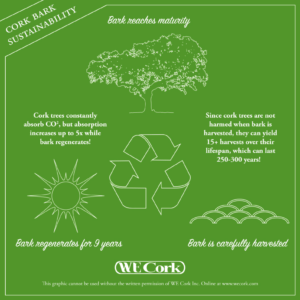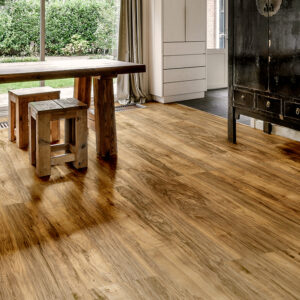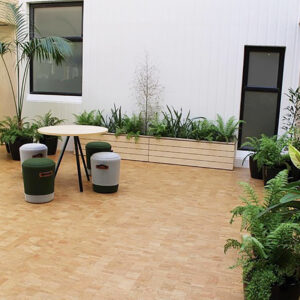(This article was provided by We Cork. It has been edited for style and length). One of the key benefits of cork flooring is its environmental friendliness. Practically speaking, cork is a 100% rapidly renewable and sustainable resource. Since cork is made from cork oak tree bark, the trees themselves are never cut down. And while the bark is regenerating over a period of nine years, the trees absorb up to five times as much CO2 as normal. Thus, the production and use of cork in sustainable design actually improves the environment, according to We Cork. (See infographic below on the cork bark sustainability lifecycle.)

A sustainable building material
The illustration above is precisely why Green Building & Design includes cork in its 20+ Sustainable Building Materials in 2023—Natural, Recycled and More. In its endorsement of cork, the publication stated:
Unlike timber, bamboo or even hemp products, cork products do not require that the entire plant be harvested—rather, the bark is all that’s collected, and doing so doesn’t harm the tree itself. This means that a single cork oak tree can be harvested multiple times throughout its natural lifespan, typically at intervals of once every nine years.
After it is harvested, cork is shredded, compressed into sheets and baked in a kiln—the finished product is then cut into planks, tiles or left as a sheet, at which point it can be used for construction purposes, typically as either flooring or insulation. Once cork products reach the end of their construction—use cycle, they can be composted back into the earth.
Understandably, architects and designers are utilizing cork as a sustainable building material. In Durable, Adaptable Cork, the New York Times highlighted buildings in which cork usage was key. Speaking of a home whose facade and roof were covered entirely with cork, one principal architect stated: “It is a sort of wonder product in terms of sustainability. Before we researched it, we didn’t realize how sustainable it was.”
Design considerations for cork
As noted above, architects and designers choose cork for its sustainability plus its other natural advantages. Cork cells contain over 200 million enclosed air cells per cubic inch, accounting for over 50% of its volume.
This makes cork:
- Acoustic – excellent for soundproofing material for floors, walls and ceilings
- Insulating – inhibiting thermal transfer through the subfloor
- Comfortable – soft, like walking on air
- Healthy – helpful to those sensitive to mold and mildew or with allergies, thanks to its naturally occurring suberin that has anti-fungal and hypoallergenic properties
Cork is also highly water-resistant, fire-retardant, resilient, compressible and frictional for non-skid purposes. All things considered, the collective benefits of cork make a very compelling case for it being the preferred sustainable design option.
Cork for sustainable interior design
It’s only natural then (pun intended) that “designers are using this super-sustainable staple” as well. Architectural Digest explains in “Designers are Clamoring for Cork—But Why?”:
Nearly every material has undergone a greenwashing campaign by this point. There are even versions of plastic that are now branded as “sustainable.” But lately, designers are embracing one surface that really does seem like the real deal: cork.
This article offers examples of how designers are using cork in creative ways throughout homes and buildings—definitely worth a look for inspiration. And as die-hard cork lovers ourselves, We Cork offers a host of cork products that can be used to design amazing residential and commercial spaces. Providing sustainable cork products since the 70’s, We Cork’s portfolio today includes flooring, underlayment, wall coverings and accessories.


Cork flooring options include a spectrum of colors and patterns ranging from traditional to contemporary. Some cork flooring features natural cork textures, while other commercial grade printed cork floors can have the appearance of cork, wood, stone or other customer designs for special projects. This make the benefits of cork flooring available for virtually any surface design.
Glue-down cork floors come in classic tiles of various thicknesses and in versatile Corkoleum rolls that are backed with recycled rubber. Alternatively, floating cork floors utilize a Uniclic locking system for quicker and easier installation.
A variety of cork underlayment options are designed for specific flooring materials (ceramic tile, marble, stone, LVT, linoleum and engineered wood floors) for applications such as crack isolation, sound control and thermal insulation. In addition to being 100% recyclable and resistant to mold and mildew, resilient cork underlayment will not compress and lose its efficacy over time, as will inferior foam products.
